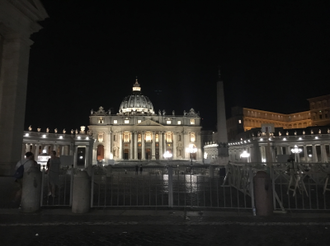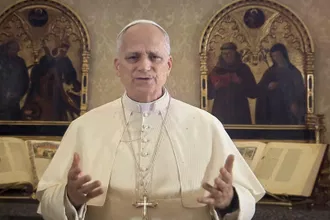Pope Leo condemns arms trade

Evening at St Peter's Basilica - ICN/JS
Source: Vatican Media/ICN
Pope Leo condemned the arms trade, in a conversation with journalists last night shortly before he left his summer residence in Castel Gandolfo and returned to the Vatican.
He said: "We must encourage everyone to leave weapons behind, and to leave behind the money-making that is behind every war... Many times, with the arms trade, people become just tools without any value," he stressed, adding that we must "constantly insist on the dignity of every human being, Christian, Muslim, people of every religion. We are all God's children, created in God's image," he continued. "So we will continue this effort."
Regarding the possibility of travelling to warzones such as Gaza, Pope Leo said: "there are many places" where he personally would "like to go, but this is not necessarily the formula for finding an answer."
Speaking about his 16 day stay in Castel Gandolfo, the Pope said that it went very well. "I was able to have a change of scene", he said, but it was "a working holiday, and I never stopped following current events," he concluded. "Thank God the voice of the Church is still important," Pope Leo said. "Let us continue to promote peace."
Pope Leo's predecessors have all spoken out against the arms trade.
Pope Francis called it a "scandal" highlighting how it contributes to violence and suffering around the world. He urged nations to prioritize peace and disarmament over military spending and arms sales.
Pope Benedict often spoke against the proliferation of weapons and the arms trade, emphasized the need for global peace and security. In September 2012 Pope Benedict said: "Arms imports to Syria need to stop once and for all. Without this, the war cannot end. We need to import creativity and ideas for peace, not arms..." He went on to define the arms market a "grave sin".
Pope John Paul II also spoke against the arms trade, especially during the Cold War, advocating for peace and dialogue instead of conflict. He emphasized the need for a global commitment to disarmament and the importance of addressing the root causes of war.


















